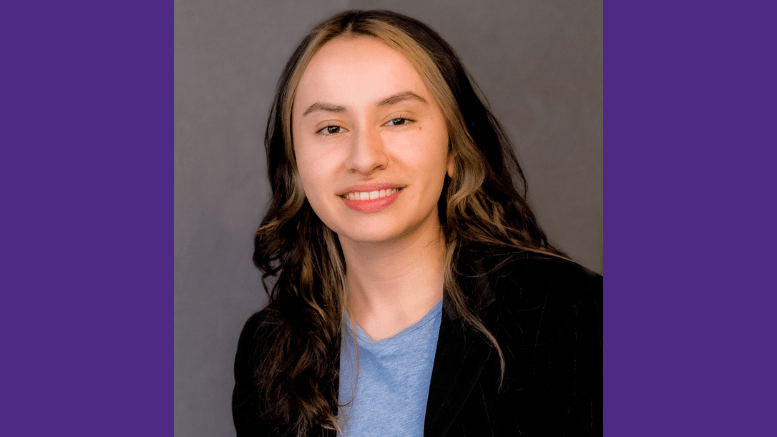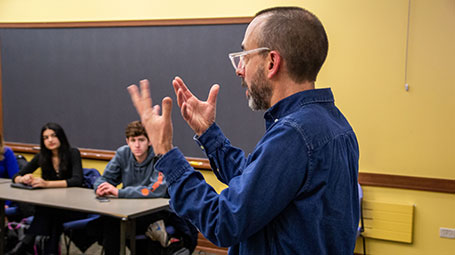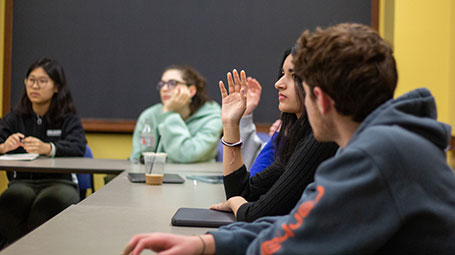
Laurisa Sastoque ’23

As a history major, you learn to think critically, read effectively, research creatively (but carefully), write cogently, and argue convincingly. You can study any region of the world in any era to understand how time and culture shape human experience, and to examine how our own lives are shaped by what has come before.
You work with some of Northwestern’s most dedicated professors in settings that range from small seminars to sweeping, dynamic lecture courses. And you are exposed to a broad range of analytical techniques, everything from close textual reading to logical deduction to spatial and quantitative analysis. History students leave Northwestern with the best of what a liberal arts education has to offer: the solid skills necessary for most professions, the engaged and critical mindset that fosters meaningful citizenship, and the spirit of curiosity necessary for lifelong learning.
In a word: everything! History majors prosper in any profession that requires research, analysis, argumentation, and communication. Some history majors follow career paths clearly related to their studies: they attend law school, they become teachers, they work in archives and museums, or they pursue graduate studies in order to become professional historians. Many enter professions that require strong research and analytical skills, such as consulting or investment banking. Others become journalists, or work with NGOs or government agencies. Some go into politics; others become doctors, architects, urban planners, engineers, or professionals in the arts. History is not a vocational major; rather it teaches you to absorb and make sense of large amounts of information, and to communicate clearly and effectively. These skills allow our majors to excel in a wide variety of occupations. For more on career paths for history majors and the value of a history education, see: "Careers for History Majors."
The best way is to take history classes! College-level history is different than what you had in high school. Northwestern’s professors don’t just teach history, they also create it through their own research and writing. And the courses they teach are not just about memorizing facts or storylines: they are about understanding where those facts come from and how and why they are used to create the stories historians tell. The History Department has more award-winning teachers than any other department at Northwestern, and our courses will sharpen your skills, expand your mind, and teach you about the world even if you do not become a history major.
If you're looking to learn more from History's very own students, hear from Eli Wallace (Undergraduate Alumni) as he discusses what led him to a History degree and how Northwestern helped launch his career!
Most students begin with a first-year seminar taught by History faculty (History 101 or 102), or with a 200-level introductory course such as Hamilton’s America (History 200), Europe in the Medieval and Early Modern World (History 201-1), Global History: The Modern World (History 250-2), or Pirates, Guns, and Empires (History 262). Students with strong high school preparation may prefer to take 300-level courses, which offer more intensive and in-depth exploration of particular topics. If you have questions about what to take, feel free to email the instructors, or email Professor Caitlin Fitz, the Director of Undergraduate Studies, at c-fitz@northwestern.edu.
The History major is designed to allow students to pursue their interests while also giving them a broad historical perspective and a firm grounding in the discipline's theory, methods, and practices. History majors must complete 12 history courses, including two seminars: one History 393 seminar on "Approaches to History" and one History 395 "Research Seminar." Beyond that, students with a geographic concentration take six courses focused on that region and four courses outside it. Global history concentrators take four global history courses and six courses outside global history.
The two required history seminars (393 and 395) are especially important in developing students’ skills in critical reading, research, writing, and oral presentations. The 393 seminars are small classes meant to teach majors about historical thinking through the intensive study of an especially fascinating event or theme. The 395 seminars foster research, analytical, and writing skills by helping students to produce an original work of history. The 395 seminar is especially vital preparation for History 398, a selective and optional senior thesis course that allows students to spend an entire academic year producing their own work of history.
When you declare a history major, you will meet with our Undergraduate Coordinator and with one of our afternoon advisers to fill out the Major Declaration Form and the history major worksheet, and then you will be assigned a permanent advisor who will give you advice throughout your years in the history department.
We do not accept AP credits in order to fulfill history department requirements. But strong performance in AP history courses does prepare you to take more advanced courses at an earlier stage of your history career. If you excelled on your AP exams, you are likely ready to move straight to 300-level history courses in that area, and you might even be prepared to take a 393 seminar as a first-year student.
Most history courses taken as part of study abroad will fulfill history department requirements, though each must be discussed and approved with a student’s departmental advisor.
The history department offers many opportunities for undergraduate education and involvement outside of the classroom, and we encourage students to take an active role in the department. All majors and minors are invited to regular faculty-student lunches. History also sponsors numerous public events where historians from Northwestern and elsewhere talk about their own research or about the historical dimensions of contemporary events. Each fall, the department also invites Northwestern alumni who were history majors back to campus to discuss how to make the most of a history degree beyond Northwestern.
Students who want to develop their research skills can be paid to work closely with faculty members as Leopold Fellows at the Chabraja Center for Historical Studies. Those who want to explore the discipline as part of an immersive intellectual cohort should apply to our two-quarter Sanders Scholars program, in which students develop original research projects in conversation with leading historians from Northwestern and around the country. Students who want extra help with writing can use the History Writing Center. And history professors are on duty to advise potential majors every afternoon.

If you want advice about the history major before declaring, you should either see one of our afternoon advisors or contact Professor Caitlin Fitz, Director of Undergraduate Studies(c-fitz@northwestern.edu). If you are ready to declare a major, or have any questions about declaring the major or fulfilling our requirements, you can contact Lorrie Graham, our Undergraduate Coordinator.